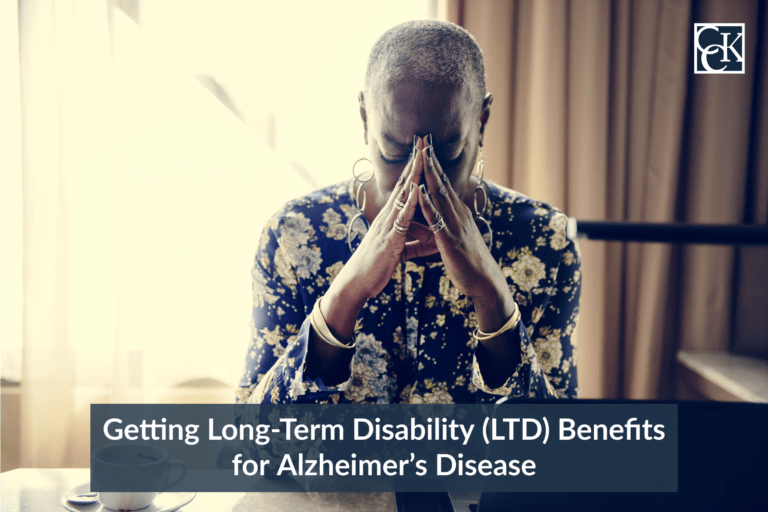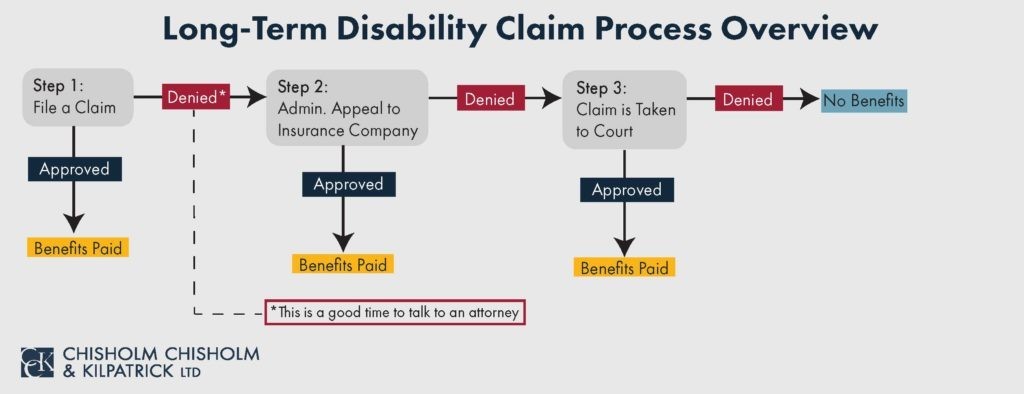Getting Long-Term Disability (LTD) Benefits for Alzheimer’s Disease

Alzheimer’s disease is a neurological disorder in which the brain begins to deteriorate over several years, leading to memory and cognitive function impairment. While over 6 million people in the United States ages 65 and over live with Alzheimer’s disease, it can affect people much younger. Alzheimer’s marks a continuous decline in cognitive abilities that affects thinking, social, and behavioral skills, and damages one’s ability to function independently. Early-onset Alzheimer’s, which can affect people as young as their 30s, can particularly impact one’s ability to stay in the workforce.
If you have Alzheimer’s disease – particularly early-onset Alzheimer’s – and it is affecting your ability to work, you may be able to apply for long-term disability benefits. Under long-term disability, a percentage of your income will be covered by monthly payments. The LTD attorneys at Chisholm Chisholm & Kilpatrick can help you make a strong claim for long-term disability benefits based on your Alzheimer’s. For a free consultation with a member of our legal team, you can contact us at 800-544-9144.
What is Alzheimer’s Disease?
Alzheimer’s disease occurs when brain cells, or neurons, become damaged and die, resulting in shrinkage and deterioration of the brain. While the exact cause of Alzheimer’s is not known, abnormal behavior by brain proteins disrupts the function of neurons, damaging them and breaking with their connections to each other, ultimately resulting in their death. This is a slow process that happens over time, sometimes beginning years before the first signs and symptoms of Alzheimer’s disease develop.

Alzheimer’s often starts in the areas of the brain pertaining to memory. Memory loss is typically among the first symptoms of Alzheimer’s, specifically the loss of newer memories such as recent conversations or events. Neuron loss then begins to affect other, deeper, parts of the brain. This results in the loss of other cognitive abilities. The deterioration of the brain caused by Alzheimer’s is irreversible and can result not only in loss of memory, but also in the loss of thinking, reasoning, social skills, personality changes, and even physical impairment.
It is important to note that while the majority of cases of Alzheimer’s disease occur in people over the age of 65, early-onset Alzheimer’s can occur in people in their 30s, 40s, or 50s. It typically progresses in the same manner as late-onset Alzheimer’s. Early-onset Alzheimer’s is heavily due to genetics, while later onset Alzheimer’s may be a combination of age, environment, and lifestyle habits in addition to genetics.
Symptoms of Alzheimer’s Disease
Memory loss is a trademark symptom of Alzheimer’s disease. Early symptoms may include difficulty in with one’s short-term memory. As the disease progresses it begins to result in the loss of older memories, as well as the loss of long-held skills and knowledge. Personality and physical changes will also occur.
Other symptoms include:
- Repetition of statements or questions
- Forgetting recent events and not remembering them later
- Frequently misplace possessions or place them in illogical locations
- Forgetting the names of friends and family, as well as everyday objects
- Trouble verbalizing thoughts and taking part in conversations
- Difficulty multitasking and unable to concentrate
- Losing the ability to work with numbers or abstract concepts
- Getting lost in familiar areas
- Unable to perform familiar tasks
- Being unable to use long-held skills, such as reading and writing, singing, drawing, or cooking
Changes in the brain can affect your personality, moods, and behaviors. Such symptoms regarding the personality include:
- Depression or apathy
- Social withdrawal
- Mood swings
- Distrust in others, irritability, and aggressiveness
- Changes in sleeping pattern
- Loss of inhibitions
- Delusions
As neurons are damaged and the disease progresses, it may also affect physical and motor skills and abilities, such as:
- Loss of balance or coordination
- Trouble standing or walking
- Weak muscles and fatigue
- Trouble controlling bowels
- Seizures and uncontrollable muscle movements
Diagnosis and Treatment
A diagnosis of Alzheimer’s includes a physical and neurological assessment by your doctor, as well as lab tests. Your doctor may question you on your symptoms and may also seek the opinion of a close family member on your behavior.
A physical and neurological exam may consist of tests regarding your reflexes, muscle tone and strength, balance, coordination, and your senses of sight and hearing. Lab testing may include blood work used to rule out the potential of other diseases that may cause memory loss. If Alzheimer’s is suspected, you may be given an MRI or CT scan, or possibly a PET scan, to capture images of your brain.
While Alzheimer’s cannot be reversed, there are treatments that can slow its progression or ease symptoms. Medication can be administered to boost neuron communication by preserving a chemical messenger that is often damaged and depleted by Alzheimer’s. Anti-depressants, which stimulate chemical activity of neurotransmitters in the brain, may also be prescribed. Such treatments cannot cure Alzheimer’s, but they can help to buy more time.
People with Alzheimer’s may also be encouraged to participate in activities that stimulate the brain naturally, such as exercise, socialization, and other mentally stimulating games or activities such as crafts, gardening, and puzzles.
Alzheimer’s Disease and Your Long-Term Disability Claim
It is important to note that Alzheimer’s typically occurs in people 65 and older, and long-term disability benefits generally do not apply to people beyond the retirement age. However, this can depend on your policy, so you will want to evaluate your policy closely to see your specific requirements. If you are younger than 65, however, you are likely eligible for benefits.

A diagnosis of Alzheimer’s disease can be devastating, but there are ways you can find security in the future. If your Alzheimer’s worsens to the point that you are unable to work, you can file a long-term disability claim that will cover your income. The attorneys at Chisholm Chisholm & Kilpatrick understand that this can be an overwhelming process and will help you compile strong evidence for your claim.
Such evidence will need to demonstrate the ways that your symptoms affect your ability to work. Loss of memory will affect any occupation and can be dangerous if you work a physical job, such as construction or machine operation, or one that depends on the mental processing of highly important or complicated data. Alzheimer’s disease affects your ability to focus, concentrate, and multitask, all of which are required in our everyday jobs. It can impact your judgment and social skills, which can hurt your ability to communicate effectively with co-workers, clients, or customers. Alzheimer’s can result in mood, personality, and cognitive changes that can also affect your ability to focus and understand your work tasks. As the disease grows more severe, you may begin to grow too physically impaired to work.
Chisholm Chisholm & Kilpatrick Can Help You with Your Long-Term Disability Claim
If you find that your Alzheimer’s is progressing to the point where you are unable to work, it can be difficult to accept that you may have to apply for long-term disability benefits. Our long-term disability lawyers understand that this can be a challenging and overwhelming process and are available to help you every step of the way. We can gather evidence, evaluate your policy to ensure your Alzheimer’s disease meets the terms of your definition of disability, and handle communication with your insurance company and doctors.

We know that Alzheimer’s disease can be age-sensitive when regarding long-term disability. We can help you understand the requirements and restrictions of your policy, and work to help you get what you are entitled to within the bounds of your policy.
Our attorneys are knowledgeable in ERISA law, which governs group long-term disability plans. Under ERISA, the appeal is the last stage at which you can submit new evidence before your claim is taken to court. Our legal team will help you gather the strongest evidence possible for your claim. This can consist of your medical records, as well as reports from your treating physician, additional experts, and even testimonies from your family and friends.
Filing for long-term disability can be an overwhelming process, especially with a debilitating disease like Alzheimer’s, but our attorneys will do everything they can to help you receive benefits. Whether you are filing an initial claim or appealing a denial, CCK can help you.
Call Today to Speak with a Member of Our Team for a Free Evaluation
Chisholm Chisholm & Kilpatrick is here to help you with your long-term disability claim. We know that a diagnosis of Alzheimer’s disease is difficult, and we can manage your claim while you take care of your health. Even after you are approved for benefits, CCK can continue to help you provide the necessary updates to your insurance company. We want to keep the burden of the long-term disability process off your shoulders.
You can speak with a member of our team today at 800-544-9144 or contact us online for a free case evaluation.
About the Author
Share this Post

